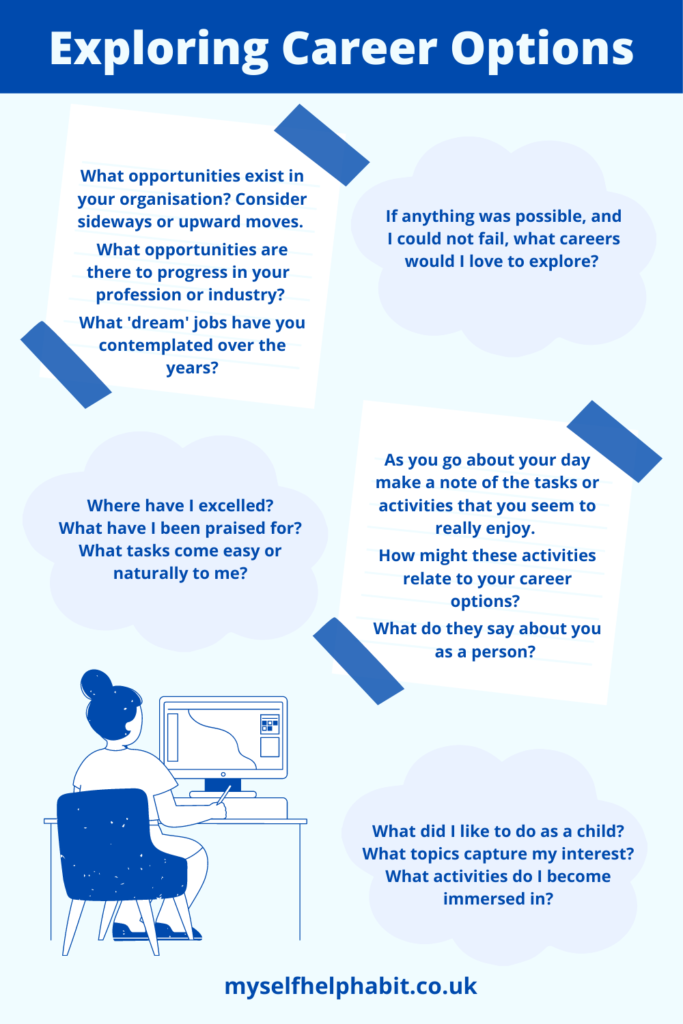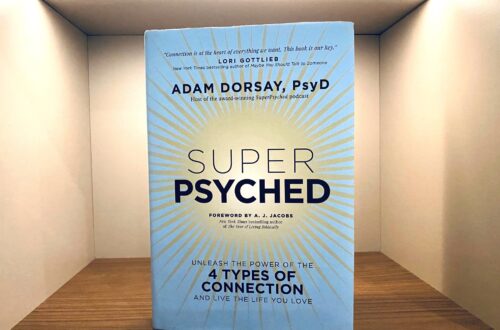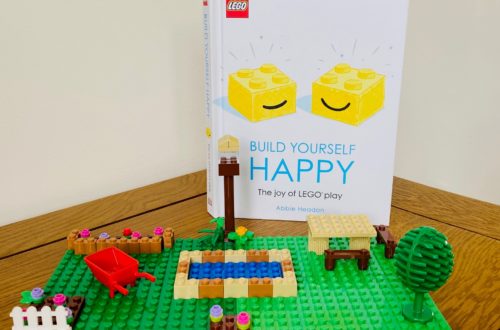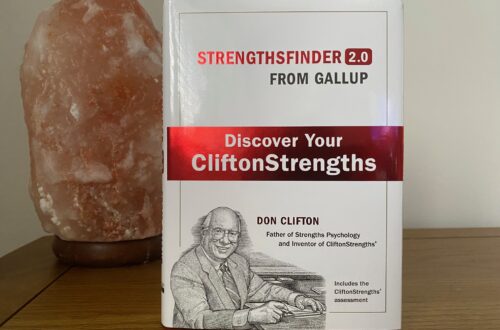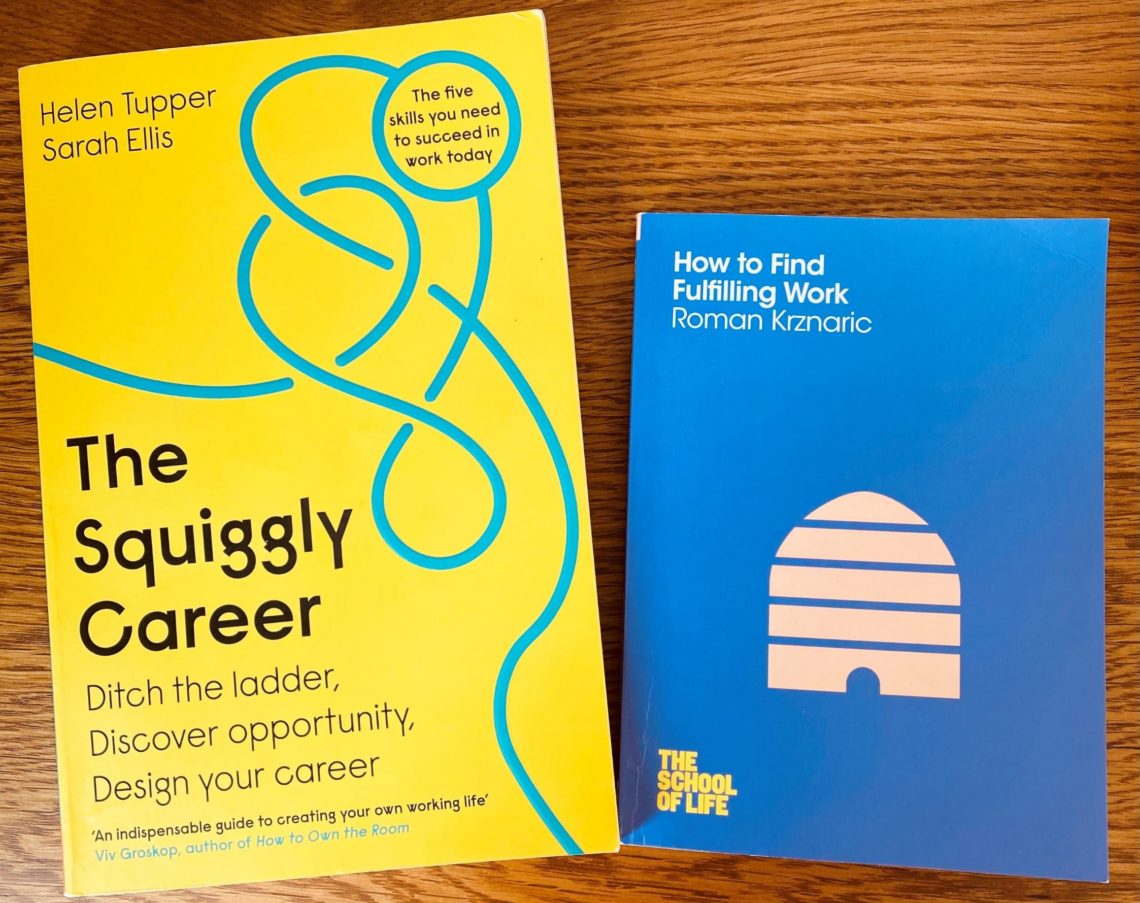
Discover what you really want from your career
Review of The Squiggly Career by Helen Tupper and Sarah Ellis
and
How to Find Fulfilling Work by Roman Krznaric and The School of Life
Losing my job when the first lockdown hit not only made me feel like I had said goodbye to a part of my identity, as an employee of an organisation that I had worked at for just over a decade, it also left me with this lingering feeling of being seriously stuck. Sure, I had home schooling to keep me well and truly occupied but I knew that wouldn’t last forever (thank goodness…) and so my thoughts kept on returning to what I was going to do next and, frustratingly, I didn’t have any answers.
I decided to make the most of the time that I had to reflect on my current situation, to get to know myself a bit better, and start exploring options that aligned with who I am. I eagerly searched for resources that would help me to get some more clarity as well as having a fair few coaching conversations about my career dilemma. In this post I will share the key insights and main takeaways from two career development books that really helped me in my quest!
If you have found yourself at a crossroads in your career and are contemplating a career change then have a go at answering the coaching questions at the end of this post. You can also use the worksheet I have provided to generate some ideas and list out job roles that you might want to start exploring.
*Disclosure: If you buy books linked to my site, I may earn a commission from Bookshop.org, whose fees support independent bookshops.
The Squiggly Career: Ditch the ladder, Discover Opportunity, Design your career* by Helen Tupper and Sarah Ellis (2020, Penguin Business, 240 pages)
Although some of us leave full-time education knowing more or less what we want to do next, and perhaps even have a clear trajectory mapped out, it is certainly not always the case. As we go out and experience the world of work we may change our minds (maybe the job of our dreams is not living up to our expectations), our priorities can shift, we might discover new interests, our paths can get knocked off course for many reasons, or perhaps our calling just hasn’t emerged yet.
This book recognises that our careers are often far from straightforward and, as the authors put it, are more ‘squiggly’ these days. We may not want to stay in the same organisation or sector for the whole duration of our career, we may face numerous restructures and redundancy, we will undoubtedly move on to new roles, we may leave employment for a period of time, decide to retrain and enter a new profession, move into self-employment, and new technologies and working patterns also impact on our jobs. In fact the recent pandemic was a catalyst for many of these changes in our careers.
With all this in mind, you are going to need a few tools up your sleeve to navigate all these twists and turns successfully, to take back control and guide your career in the direction that you want it to go. This is where The Squiggly Career book comes in! It is highly practical and includes plenty of exercises that will help you to make the most of where you are right now in your career as well as encouraging you to think further ahead, to your next move.
As well as giving you the opportunity to reflect on your career the activities in the book will enable you to:
- establish what you are really good at, home in on your strengths and, importantly, consider how you can use these strengths in your everyday activities
- pinpoint your core values, define what they mean to you and think about how these values can influence your decision making
- open up about the thoughts and behaviours that hold you back at work, get to the bottom of the limiting beliefs that underpin these thoughts/behaviours, and then think of actions that you could take to challenge them. The authors also include some simple techniques that you can try out to boost your confidence
- map out different job roles that you could investigate further, assess how they align with your values and strengths, and consider how they might open doors for you further down the line
- identifying what support you need, and who can provide that support, as you go through your career (as well as how to find and approach suitable mentors)
- maintain your curiosity and continued development as you go through your career.
Towards the end of the book, the authors share some useful guidance on common ‘career conundrums’ that you may need to know how to handle (such as setting up projects to test out your ideas, gaining experience of leading others, etc.) and you are even treated to ‘100 Pieces of Careers Advice’ from various professionals.
This book contains lots of helpful tips and insightful exercises making it a handy companion that you can keep with you, and return to, while you are on your career journey.
Furthermore, you can carry on developing your career with the authors long after you have finished the book. They are the founders of a career development company called Amazing If and generously provide free learning materials on their website and hold free, weekly group calls. You can also listen to The Squiggly Careers Podcast and dip into the episodes that are relevant to where you are in your career.
How to Find Fulfilling Work* by Roman Krznaric and The School of Life (2012, Macmillan, 160 pages)
I actually have the authors of The Squiggly Career to thank for this one! They recommended this amazing book in one of their podcast episodes and I snapped it up right away. I soaked up Krznaric’s clever mix of careers guidance with philosophy, psychology and the historical context of work.
Balanced with encouragement to get on and do the activities that make finding fulfilling work possible is also an acknowledgment of the struggles and obstacles that we can face when making career changes.
We might be experiencing fear and a lack of confidence in our abilities or decision-making. We might be wondering how we can finance a career change and manage our parental or caring responsibilities. Krznaric gives you room to reflect on how you are feeling about your current situation and helpfully suggests ways that you can overcome such challenges. After reading through the advice in the book I came away feeling reassured, clearer about the road ahead, and keen to start taking some action.
Deciding what you might like to do
When you are mulling over your career options you may feel pressure to ‘get it right’ which can often lead to inertia. This book alleviates that pressure and tackles the overwhelm that can occur when we are swamped with job search results, personality tests and opinions from our loved ones and colleagues. Krznaric suggests that there are three essential ingredients that we should focus on and look out for in our search for fulfilling work: meaning, flow and freedom.
This is where you need to come back to yourself and:
- unearth your core values and reflect on what a meaningful career would look like to you
- identify the tasks or activities that you find so immersive that time, and everything else that might be going on around you, just disappears!
- decide how much autonomy and freedom you want (both inside and outside of your role).
Give things a go!
Krznaric teaches you that, even after having done all the reading up that you can on a particular career, and having taken numerous assessments, there is no substitute for experience when it comes to finding out what you really want.
I can certainly vouch for this! I moved into a role that, considering all my interests, appeared to be something that I might find fulfilling. It ticked a lot of boxes on my list of requirements (that I had spent ages devising from all my assessments) but, much to my disappointment, just a few days into the job I began to feel like it wasn’t the right role for me. I persevered, gave myself ample time to settle in, but I still wasn’t enjoying it as much as I thought I would.
However, on reflection, this experience helped me to find some more missing pieces of the puzzle. I reflected on what it was in particular that I didn’t like about the job and went back to my core values, assessing just how much the role met those values (now that I knew what it was really like).
I came away with more knowledge about what I did and did not want from my next role, had developed some new skills, and could see that the experience I had gained would open up other opportunities. So, even if you do take a bit of a wrong turning, you can learn from it and move on.
Take small steps
You need to be willing to try different career options so that you can make decisions that are right for you. If this is making you wince slightly, Krznaric assures you that you don’t have to make a huge leap and immediately hand in your notice. You can test out your options and gradually build up your confidence.
I have done this in my own career, following my interests, sometimes in small ways, while holding down full-time roles. This entailed making the most of my lunchtimes, negotiating time away from the office with my manager and working evenings/weekends. I have joined coaching and mentoring schemes, set up a personal development network, been on short and inexpensive (or free) training courses, joined free Facebook and LinkedIn groups, spoke to people who were already in the roles that I was interested in, and….started this blog!
This book has taught me that a career change doesn’t have to be an ‘all eggs in one basket’ and a ‘no going back now’ approach. By being open to exploring different options, taking small actions, and then reflecting on your experiences, you will soon find out whether the work that you are interested in is something that you would like to pursue further or not.
Thinking about taking the next steps in your career? Here are some coaching questions to help you to reflect and generate some ideas:
Where are you now in your career and what do you want from it?
- On a scale of 1-10 (1 being ‘Not at all satisfied’ and 10 being ‘Extremely satisfied’) how satisfied are you right now with your career?
- If you are not already at a 10, write down what a 10 would look like for you in this area of your life?
- Make a list of all the things that are important to you about work. How well does your current or previous job match up to that list? What changes would you like to make now that you know what is important to you?
What is holding you back from making a career change?
- What could staying exactly where you are cost you in the long term?
- What beliefs do you hold about yourself that might be stopping you from making a career change? Write them down and try to capture them whenever they come into your mind during your day. Start questioning these beliefs by working through some of the exercises in this post (scroll down to the Coaching Tools heading where you will find exercises on mind mapping your thoughts and capturing your inner critic).
- What assumptions are you making that prevent you from moving on in your career? How can you test out and challenge these assumptions?
- What else might be holding you back from making a change in your career? How can you begin to address these obstacles?
Now download the worksheet and go through the prompts to bring out your strengths, interests, and opportunities. Think about how they might inform your next move.
Once you have created a list of options ask yourself:
- Which of these options are most interesting to me? What would I like to investigate further?
- What small steps can I take to investigate these options? When am I going to take these steps? Try to commit to a specific date/time and put it in your diary.
- What support might I need from others (e.g. mentors, colleagues, my line manager, friends, my partner)?
- What resources do I need and how will I obtain them?


